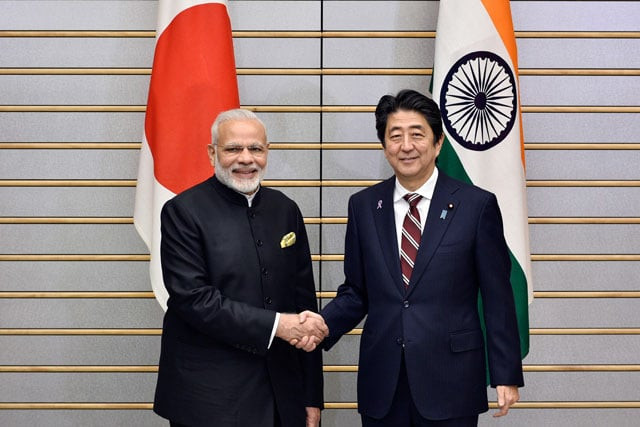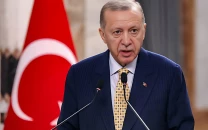Modi and Abe plan Asia-Africa link to counter China's OBOR and CPEC
India accused China of undermining its sovereignty through CPEC

India's Prime Minister Narendra Modi (L) shakes hands with his Japanese counterpart Shinzo Abe at the start of their meeting at Abe's official residence in Tokyo on November 11, 2016. PHOTO: AFP
India’s first bullet train project, a $19-billion initiative linking Ahmedabad to Mumbai, was launched Thursday as Indian Prime Minister Narendra Modi and Japanese counterpart Shinzo Abe hailed fast-growing ties between Asia’s two biggest democracies.
The project is seen as emblematic of warming relations between New Delhi and Tokyo, who are seeking to combat China’s growing regional influence. The high-speed link, which will use Japanese technology to connect the main city of Modi’s home state with India’s financial capital, is scheduled for completion by December 2023.
Japan's Abe to launch $17-bln Indian bullet train project as ties deepen
Abe referenced to how Japan’s ‘Ja’ the first two letters of the country’s name, when met with India’s ‘I’ will result in ‘JaI’ at the launch of the bullet train to show the warming ties between the two countries. While the Japanese PM said he would do all he could for India, Modi responded by saying Japan was a true friend which offered loans at virtually no interest. "The difference a half percent can make in interest rates is evident, particularly to people in Ahmedabad... Here is a friend who says 'Pay back the loan over 50 years'," said Modi, acknowledging Abe's commitment to initiatives such as Make in India, reported Times of India.
Modi’s fourth annual summit with Abe showed the interests of the two to offer an alternative vision to China’s OBOR (One Belt, One Road) project. India and Japan signed 15 agreements during the talks, one of which was to create an Act East Forum.
The forum will aim to enhance connectivity and promote developmental projects in India’s northeast. With many seeing OBOR as the instrument to furthering China’s geopolitical objectives, the two PMs clearly sent a message to Beijing as they called on both the countries to play a central role in safe-guarding the Indian-Pacific through cooperation and connectivity.
Both India and Japan decided to drop specific mention of South China Sea from the joint statement issue despite reaffirming their commitment to the freedom of navigation in the Indian-Pacific. Foreign Secretary of India, S Jaishankar, said the principle was being acknowledged in the reference to Indian-Pacific rather than “specific geographies”. This is significant as China and India successfully resolved the Doklam stand-off recently.
Japanese officials said that all issues of strategic interest came up in the dialogue, while Jaishankar claimed that Doklam wasn’t specifically discussed. In an open declaration at China, Modi and Abe also underlined the importance of all countries ensuring the development of infrastructure and connectivity “in an open, transparent and non-exclusive manner based on international standards and responsible debt financing practices, while ensuring respect for sovereignty and territorial integrity, rule of law, and the environment”.
India's first bullet train project fast-tracks Japanese ties
India has accused China of undermining its sovereignty through the China-Pakistan Economic Corridor (CPEC) a show piece of the OBOR project. There was no formal launch of an Asia-Africa growth corridor, Modi and Abe welcomed efforts to explore the development of it. The joint statement said that it will benefit various stakeholders in the India-Pacific region including Africa. Abe, in his meeting with Modi called for "combining'' Asia, a continent that is rapidly growing, with Africa which has huge growth potential.


1725099588-0/BeFunky-(41)1725099588-0-208x130.webp)
















COMMENTS
Comments are moderated and generally will be posted if they are on-topic and not abusive.
For more information, please see our Comments FAQ